Our life has been a little disrupted this past ten days because climate change has become more personal than ever. Our son Eric, who has lived in the New York area for some 25 years, lost his house near Danbury, Connecticut, to a large oak tree that split it in half during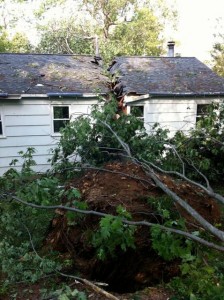 a violent tornadic wind storm. Fortunately, he had left two hours earlier to come here for the summer to begin executing his long-planned effort to move his entertainment and theater business to western North Carolina. (You can check out his work at his website.) He was called back by a neighbor to begin the arduous process of salvaging his remaining belongings, find an insurance adjuster who could represent him, and secure the services of an arborist to remove the tree. They were busy. Over fifty trees had been broken or uprooted in his little community. Over 100,000 were without power. It took a seventy-ton crane to remove it. A damaged tree awaits removal, hopefully before it falls on his neighbor’s house. Instead of crushing the house, the trunk split through it like a cleaver, driving the studs through the basement joists, breaking the entire inner structure. He is now safely with us – who had no power when he arrived due to storms in our area!
a violent tornadic wind storm. Fortunately, he had left two hours earlier to come here for the summer to begin executing his long-planned effort to move his entertainment and theater business to western North Carolina. (You can check out his work at his website.) He was called back by a neighbor to begin the arduous process of salvaging his remaining belongings, find an insurance adjuster who could represent him, and secure the services of an arborist to remove the tree. They were busy. Over fifty trees had been broken or uprooted in his little community. Over 100,000 were without power. It took a seventy-ton crane to remove it. A damaged tree awaits removal, hopefully before it falls on his neighbor’s house. Instead of crushing the house, the trunk split through it like a cleaver, driving the studs through the basement joists, breaking the entire inner structure. He is now safely with us – who had no power when he arrived due to storms in our area!
This is the second person in our family network who has lost their house this year. Our daughter Aneliese’s stepdaughter lost her home to the Alabama tornado outbreak. One always has to say that weather is not climate and that we have cycles of weather patterns. However, when events like 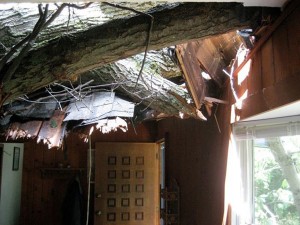 this start changing your life, you pause for another look. The fires, floods, tornados, heat, and extreme winter snows are exactly what has been predicted for some years by climate scientists as effects of global warming due to atmospheric carbon dioxide levels. We now move from prediction, warning and prevention to damage mitigation and strategies for coping with the migrations, wars, and natural calamities that probably await us. Within this perspective the trivialities of celebrity culture, the dysfunctionality of partisan political gridlock, and the enormous diversion of resources to military expenditures blind us to our overarching challenge of seeking a more sustainable relationship with our planet and, through that partnership, with each other. The main point of Red Clay, Blood River comes back to center screen: There is no human reconciliation without reconciliation with the earth. These storms deliver a message to our human habitat that we have now gone too far. The trees are talking to us in the wind.
this start changing your life, you pause for another look. The fires, floods, tornados, heat, and extreme winter snows are exactly what has been predicted for some years by climate scientists as effects of global warming due to atmospheric carbon dioxide levels. We now move from prediction, warning and prevention to damage mitigation and strategies for coping with the migrations, wars, and natural calamities that probably await us. Within this perspective the trivialities of celebrity culture, the dysfunctionality of partisan political gridlock, and the enormous diversion of resources to military expenditures blind us to our overarching challenge of seeking a more sustainable relationship with our planet and, through that partnership, with each other. The main point of Red Clay, Blood River comes back to center screen: There is no human reconciliation without reconciliation with the earth. These storms deliver a message to our human habitat that we have now gone too far. The trees are talking to us in the wind.

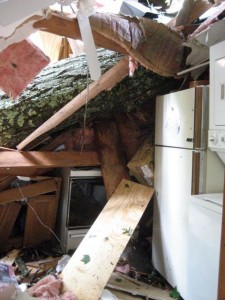
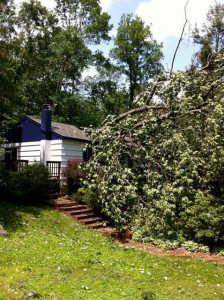



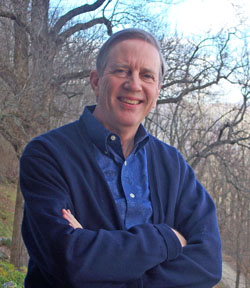
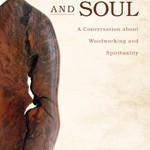
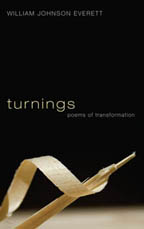
 Red Clay, Blood River
Red Clay, Blood River
Bill:
Lynne and I were saddened to learn (and see) the destruction to Eric’s house in CT.
I am so sorry for his loss! Will this possbilly mean he will move more quickly to North Carolina to begin the next phase of his life?
Blessings to all during this tremendoulsy stressful time.
Steve